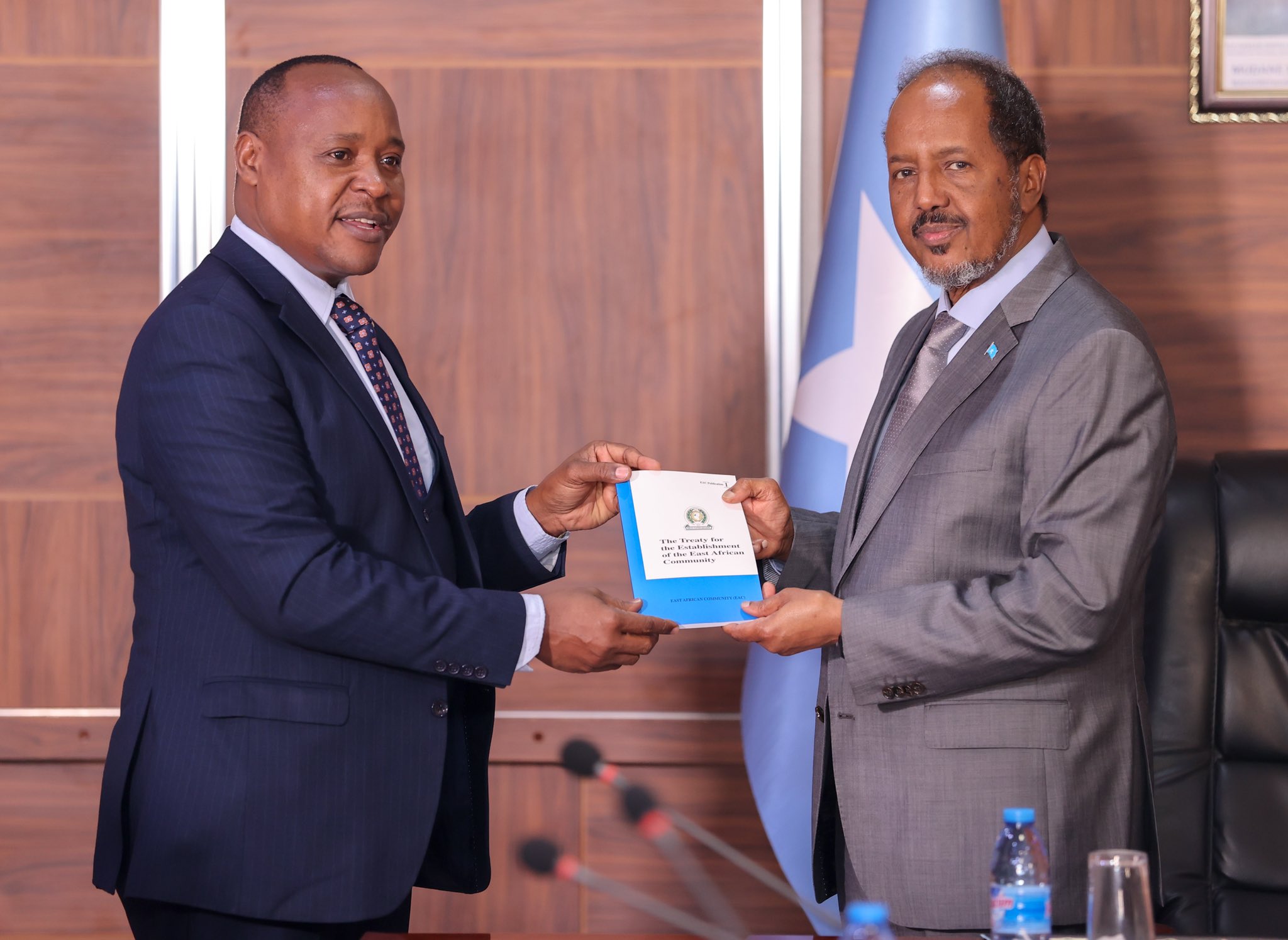[ad_1]
Somalia is poised to become the East African Community’s (EAC) eighth member state at the economic bloc’s December summit. This follows negotiations in August between the EAC and Somalia, hosted by the Kenyan government.
With the Democratic Republic of the Congo (DRC) joining in March last year, both memberships represent the EAC’s expansion across East Africa and the Great Lakes Region. The EAC also envisages Ethiopia and Djibouti becoming members. This potential growth could increase the bloc’s population to over 800 million – an immense boost to the EAC’s internal market.
Expansion would also increase the EAC’s competitiveness regarding foreign direct investments by offering an attractive trade area. Once Somalia’s security and governance challenges are addressed, the country’s inclusion could add immense economic benefits to the region.

Due to the EAC Customs Union, Somalia’s accession to the bloc will be economically beneficial for the country and its immediate neighbours. Gains include a reduction of tariff and non-tariff barriers and integration into future infrastructure projects that boost trade and reduce transport costs by linking EAC partner states. Somalia’s inclusion will also bring over 3,000 km of coastline – the longest in Africa – into the bloc, giving access to the Arabian Peninsula and boosting trade.
Entrepreneurs in Somalia will have greater investment opportunities, easing some of the social and economic pressures that have come with its isolation. Since the collapse of the Mohamed Siad Barre regime in 1991, cross-border trade with neighbouring countries has decreased due to insecurity caused initially by civil war and later by Al-Shabaab’s terrorist attacks.
Although there are many benefits to joining the EAC, the depth of Somalia’s security problems raises critical questions about the bloc’s readiness and capacity to ensure peace, security and regional stability. Article 3 of the EAC Treaty stipulates the criteria for admitting new countries. They must adhere to principles of good governance, democracy, the rule of law, human rights and social justice.
Somalia scores low on these requirements due to decades of civil war and violent extremism. Accusations of corruption, and low levels of human rights and justice due to the breakdown of government institutions and the inability to conduct national elections, complicate its democratic credentials.
But all is not lost. The past few years have seen promising developments around establishing a functional administration and renewing the fight against terrorism. Although not defeated, al-Shabaab is retreating from some of its key territories.
EAC citizens are exempt from visa requirements and travel freely within the region. The prospect of Somalia-based insurgents moving into member countries, an unregulated influx of economic migrants, and smuggling of contraband and arms could make some EAC states jittery about allowing Somalia into the fold.
The recent launch of national identity cards in Somalia is timeous. The card could help facilitate free and fair elections in the country and potentially allow unfettered movement of citizens in the bloc. Identity cards could also help control economic crimes, money laundering and terror financing, and increase tax revenue collection.
Hassan Khannenje, a Horn of Africa expert, told ISS Today that: ‘Somalia will be one of the least prepared countries [and] may not meet its obligations to the community when some member states are free-riding, especially when it comes to financial commitments.’ South Sudan and Burundi are yet to disburse $27.4 million and $7.44 million respectively, as their annual contributions that were due by the end of 2022.
Without reconciliation talks between Somalia and Somaliland and the resolution of the simmering Las Anod border conflict, Khannenje foresees a diplomatic impasse because some EAC members have a diplomatic presence in both capitals, Hargeisa and Mogadishu.
Another question is whether the EAC can help manage Somalia’s security challenges and maintain regional stability. With the planned withdrawal of the African Union Transition Mission in Somalia (ATMIS) and a reinvigorated counter-insurgency by the Somali National Army and clan militia, talks are gaining traction on the post-ATMIS security infrastructure.
The EAC’s approach and capacity on security issues was seen with its deployment of regional forces to the DRC just a few months after the Great Lakes country joined the bloc. The critical question is, would Somalia expect similar support? Some EAC partner states are ATMIS troop-contributing countries, so such an arrangement would require careful negotiations given the increased threat al-Shabaab poses to Somalia joining the bloc.
READ ALSO: U.S. Pentagon chief meets Somalia’s president over regional security, other issues
The EAC’s proactive approach could help solve Somalia’s precarious security situation. On the political front, the bloc’s intervention through appointed dignitaries could enable Somalia’s Federal Government to engage in dialogue, popularise its offers for amnesty for al-Shabaab fighters, and enable grass-roots dialogue in conflict-affected communities.
It is crucial for the EAC to adopt measures that ensure East Africa optimises the benefits of Somalia’s entry. Potential problems must be addressed with foresight once the December EAC summit approves the newest member’s entry.
Halkano Wario, Regional Organised Crime Observatory Coordinator – East Africa, ENACT and Rahel Hassen, Project Manager and Senior Researcher, East Africa, Institute for Security Studies (ISS) Nairobi
(This article was first published by ISS Today, a Premium Times syndication partner. We have their permission to republish).
Support PREMIUM TIMES’ journalism of integrity and credibility
Good journalism costs a lot of money. Yet only good journalism can ensure the possibility of a good society, an accountable democracy, and a transparent government.
For continued free access to the best investigative journalism in the country we ask you to consider making a modest support to this noble endeavour.
By contributing to PREMIUM TIMES, you are helping to sustain a journalism of relevance and ensuring it remains free and available to all.
Donate
TEXT AD: Call Willie – +2348098788999
[ad_2]
Source link








